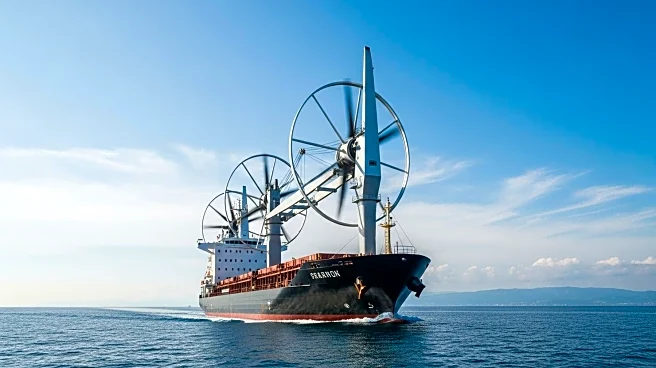What is the story about?
What's Happening?
U-Ming Marine Transport Corporation has successfully installed four Rotor Sails on its very large ore carrier (VLOC) vessel, Grand Pioneer. This marks the first instance of a Taiwanese shipowner adopting wind-assisted propulsion technology. The sails, provided by Anemoi Marine Technologies, were installed at COSCO Zhoushan Shipyard during a scheduled dry-docking. The installation process was efficient, taking only 1.5 days to lift and fix the sails, followed by five days of commissioning and testing. Jeff Hsu, Vice Chairman of U-Ming, emphasized the importance of this step in the company's decarbonization efforts, highlighting the need for sustainable and competitive global shipping. Clare Urmston, CEO of Anemoi, praised U-Ming's decision as a demonstration of their commitment to decarbonization. The Grand Pioneer will continue its service on a long-term charter with Brazilian mining company Vale, transporting iron ore between Brazil and China, and is expected to achieve annual fuel and emissions reductions of approximately 10-12%.
Why It's Important?
The installation of Rotor Sails on the Grand Pioneer represents a significant advancement in maritime decarbonization efforts. By adopting wind-assisted propulsion technology, U-Ming is setting a precedent for other shipowners, particularly in Taiwan, to follow suit in reducing emissions. This move aligns with global initiatives to lower carbon footprints in the shipping industry, which is a major contributor to greenhouse gas emissions. The projected fuel and emissions reductions of 10-12% are substantial, offering both environmental benefits and potential cost savings in fuel consumption. As the shipping industry faces increasing pressure to comply with international environmental regulations, innovations like Rotor Sails could become more prevalent, driving a shift towards greener maritime operations.
What's Next?
Following the successful installation, the Grand Pioneer will resume its operations, transporting iron ore between Brazil and China. The long-term charter with Vale ensures continued utilization of the vessel's enhanced capabilities. U-Ming's adoption of Rotor Sails may encourage other shipowners to consider similar technologies, potentially leading to wider implementation across the industry. As environmental regulations tighten, the demand for sustainable shipping solutions is likely to grow, prompting further investments in green technologies. Stakeholders, including environmental groups and regulatory bodies, may closely monitor the performance of the Grand Pioneer to assess the effectiveness of Rotor Sails in real-world conditions.
Beyond the Headlines
The decision by U-Ming to install Rotor Sails reflects broader trends in the shipping industry towards sustainability and innovation. This move not only addresses environmental concerns but also positions U-Ming as a leader in adopting cutting-edge technology. The successful implementation could influence regulatory policies, encouraging more shipowners to invest in similar technologies. Additionally, the collaboration between U-Ming and Anemoi highlights the importance of international partnerships in advancing maritime technology. As the industry evolves, ethical considerations regarding environmental impact and corporate responsibility will likely play a more significant role in business decisions.














